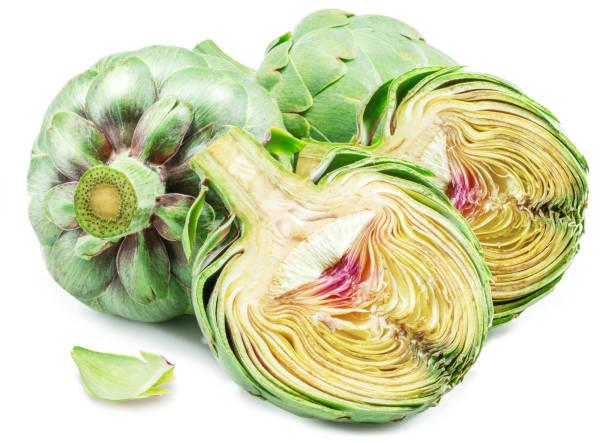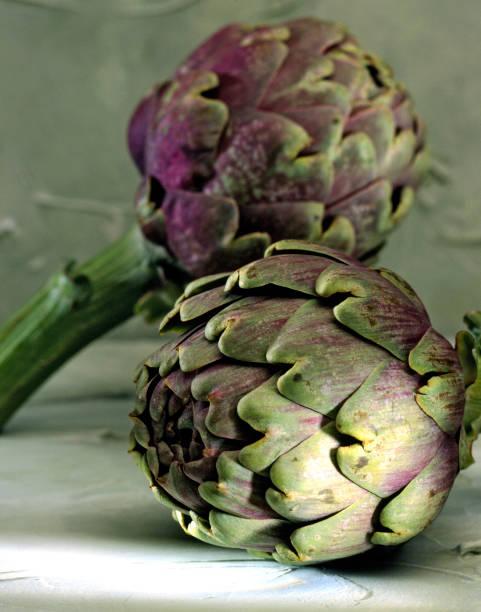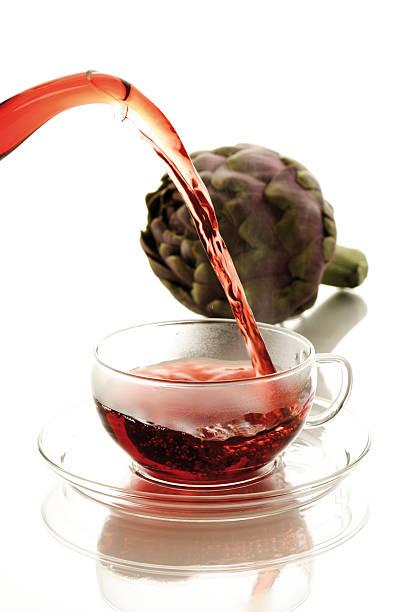Ce légume du mois mai n’a fait son apparition en France qu’à partir de la Renaissance, par l'intermédiaire de Catherine de Médicis qui l'aurait alors introduit à la cour. Il n'était connu jusque-là qu'autour du bassin méditerranéen, en Afrique du Nord et plus tardivement en Italie et en Espagne.
The consumable parts of the artichoke, the leaves and the the leaves and the heart are the delight of gourmets.
In terms of phytotherapy, our star vegetable of is not to be outdone since its leaves concentrate bio-active elements with well-known bio-active elements with well-known therapeutic properties.

How to consume the artichoke?
Artichokes are usually eaten warm, cooked whole in boiling water or steamed, accompanied by a vinaigrette.
Artichoke bottoms are particularly tender and and tasty, can be eaten like this or stuffed with fresh cheese, or with with fresh cheese, or with a mushroom stuffing for example.
For my part, I particularly appreciate the
artichoke velouté, which is incomparably sweet in the mouth.
The small purple artichokes lend themselves more to a preparation called "en barigoule".
preparation known as "en barigoule".
They are cooked with white wine, bacon and an and an aromatic garnish of thyme and bay leaves.
Some people like them raw, when they are young and young and tender with a good vinaigrette.
But if artichokes are a treat for the taste buds their quality does not stop there.
They also have many health benefits health benefits.
Is your liver on the verge of burn-out ? Have you thought about artichokes?
Artichoke contains several active substances and interesting nutrients, but it is especially known for its action on the liver, thanks to the presence of a very particular polyphenol: cynarine.
It is this chemical compound that gives a bitter taste to foods that contain it.
And when you buy artichoke extract in the form of capsules or liquid, it is this active ingredient that makes up the majority of your supplement.
Its action targets particularly the liver because of its choleretic effects (stimulation of the production of bile), cholagogues (which facilitates the evacuation of the bile towards the intestine) and protectors.
Simply put, artichoke helps the liver do its job while protecting it from damage for a variety of reasons.
When the body is on the verge of burn-out due to an overly rich diet or an accumulation of toxins, cynarine gives it a boost.
Moreover, artichoke leaf extract is one of the rare herbal remedies whose clinical trials have delivered a definitive verdict: its beneficial action on the liver reported by tradition is real.
Artichoke allows this precious organ, the liver, to function optimally and has a protective effect on it when it is sick.

This is the case, for example, with non-alcoholic fatty liver disease (accumulation of fat in the liver cells, commonly referred to as fatty liver disease), which is the most common cause of chronic liver disease in the world.
A study shows that 600 mg of artichoke extract per day for 2 months allowed patients to see the disease recede (the various markers linked to the pathology had notably decreased).
Note that the total cholesterol of all participants was also reduced in the process.
And yes, the great thing about a well-functioning liver is that it impacts cardiovascular health (and overall wellness)!
Fats are better digested, toxins are eliminated...
The result is not long in coming: the heart is preserved, especially from cholesterol damage and oxidative stress.
How to cleanse your body in depth?
The diuretic action of the artichoke comes complete the disengagement of the liver for a detox effect on the whole the whole body.
This property comes from the large quantities of potassium of potassium that it contains (387 mg for 100 grams).

By stimulating the kidneys, the artichoke allows to eliminate more.
So if you suffer from water retention, you will benefit greatly from regularly consuming artichoke or artichoke-based supplements.
Our vegetable of the month also contains soluble dietary fiber of the prebiotic type (inulin).
This promotes good transit and helps maintain beneficial intestinal flora.
If you are planning a detox for spring, the arrival of the artichoke on the shelves comes at the right time.
Put in place the appropriate dietary measures (a diet low in bad fats and sugar), have a regular physical activity and give a little boost to the elimination functions of your body with the artichoke.
For this, I give you a quick and simple infusion recipe:
- Bring to a boil a liter of spring water to which you will have added 4 tablespoons of dried artichoke leaves (to be bought in herbalist's shop) and a tablespoon of green anise seeds.
- Remove from heat as soon as water starts to boil and let infuse for 10 minutes then strain.
You can drink this infusion throughout the day to accompany your detox.
Consider drinking a cup before your meals to help digestion.
What are the different supplements available?
The supplement that you will find most often comes in the form of liquid extract in ampoules (often coupled with black radish).
If this form does not suit you (the taste is not very pleasant, to say the least...), you can always fall back on the dry extract capsules.
They are generally dosed between 400 and 600 mg per capsule and the dosage is three capsules per day to clean the liver.
You also have the possibility of turning to the mother tincture of artichokeTo be taken three times a day, 20 to 30 drops diluted in a drink.
The taste is not really great either, I grant you, but this process has the advantage of extracting more active substances than ampoules or dry extracts.
In this sense, my preference is for the integral fresh plant suspension (IFPS).
This process is protected by a European patent and it allows to preserve the entire active principles of the fresh plant (the totum).
Stabilization, drying, filtration, or preservation techniques used for other galenic forms are prohibited.
Be careful, however, artichoke is contraindicated in case of gallbladder stones, allergies to asteraceae and breastfeeding.



